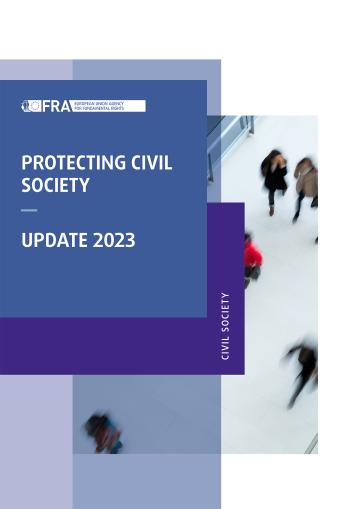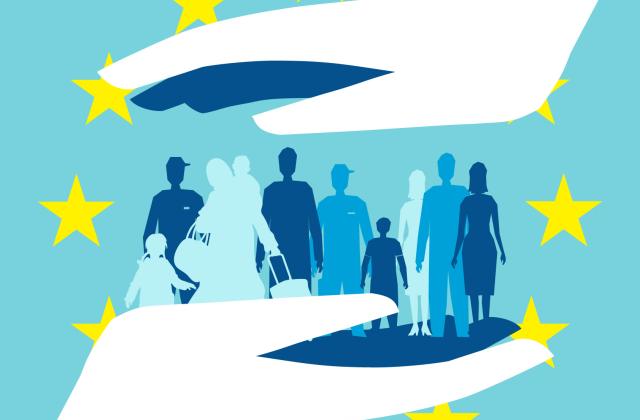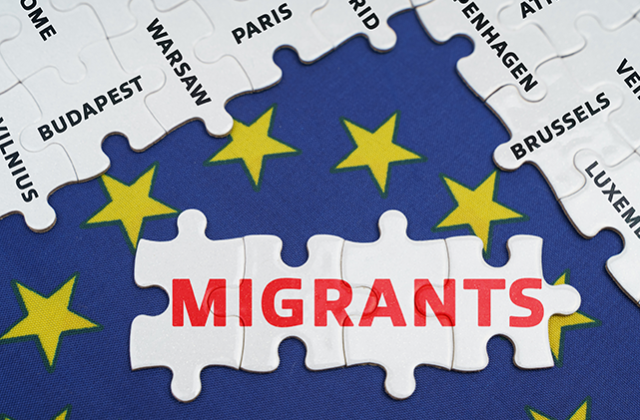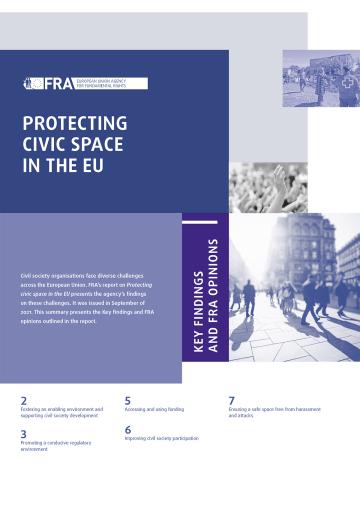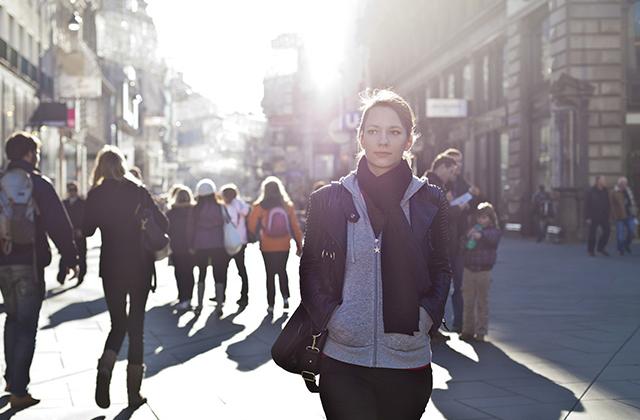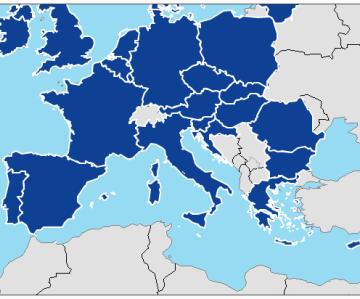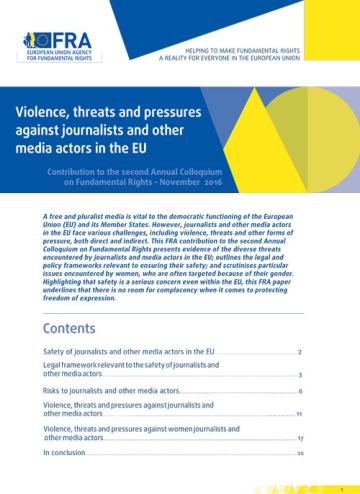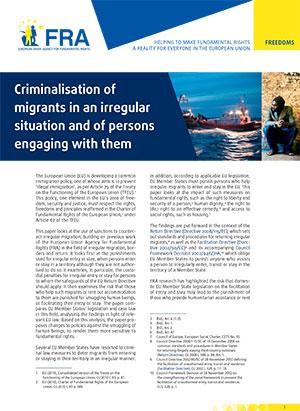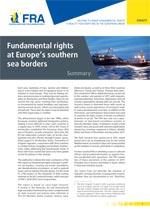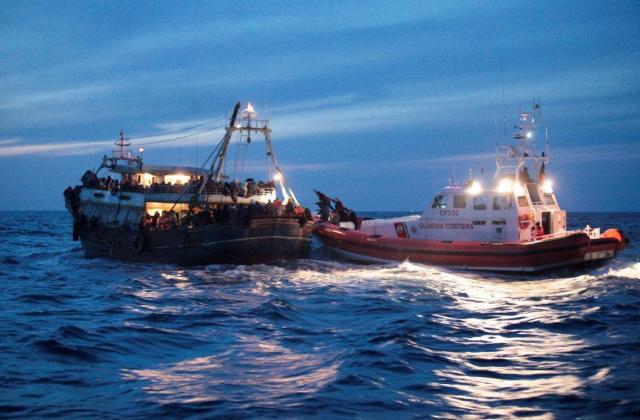To engage in human rights work, CSOs need financial, human and material resources and access to national and international (public and private) funding; the ability to travel and communicate without undue interference; and the right to benefit from the protection of the state.
The Organization for Security and Co-operation in Europe’s ODIHR and Venice Commission guidelines on freedom of association note that “the ability to seek, secure and use resources is essential to the existence and operation of any association”. Access to and the use of funding provide associations with the means to operate and pursue their missions and are therefore inherent elements of the right to freedom of association.[153] OSCE (2015), Joint guidelines on freedom of association, Warsaw, OSCE/ODIHR.
In addition, the Council of the European Union recently acknowledged “that civil society actors at all levels need appropriate and sufficient human, material and financial resources to carry out their missions effectively and that the freedom to seek, receive and use such resources is an integral part of the right to freedom of association”.[154] Council of the European Union (2023), Council Conclusions on the application of the EU Charter of Fundamental Rights; The role of the civic space in protecting and promoting fundamental rights in the EU, 24 February 2023.
As regards financial resources, typically CSOs rely on funding and income from a variety of sources. These include the public sector, international organisations, individual donors, foundations and philanthropic organisations, corporations, membership fees and income-generating activities.
Finding and accessing resources remains an ongoing concern for CSOs.[155] FRA’s 2018, 2021, 2022 civic space reports.
In FRA’s 2022 civic space consultation, 58 % of responding organisations often or sometimes experienced obstacles to accessing resources/funding.[156] FRA’s 2022 civic space consultation.
FRA’s 2022 consultation shows that the major challenges for national and local organisations in 2022 were connected to difficulties in finding funding relevant to their work (67 %) (Figure 8). Other recurrent difficulties concern applying for funding (complicated application procedures, limited administrative capacity to apply) (42 %), using the funding received (lack of core funding, lack of follow up funding, too short funding cycle) (33 %) and accessing funding (publicly available information difficult to find, overly restrictive eligibility criteria, rules on foreign funding) (32 %).
The results reveal some differences between EU-level and national-level organisations. National organisations encountered challenges in finding funding relevant to their work, and using funding, more frequently than international/EU organisations, while organisations at international/EU level seemed to have more difficulties applying for funding than national and local organisations.
Figure 8 – Difficulties CSOs face with regard to funding (%)
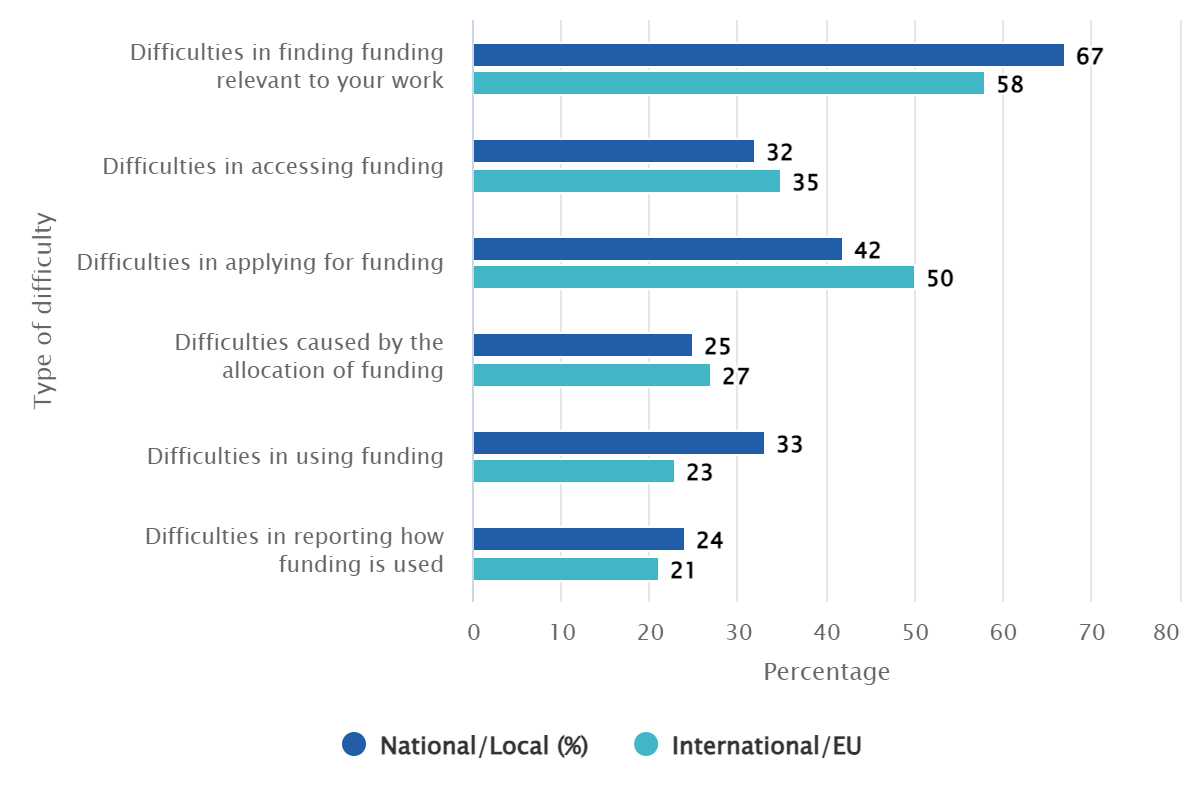
A bar chart shows the different types of difficulties faced by organisations working at the national/local level compared to those working at international/EU level. The results are described in the text in the two paragraphs preceding the figure.
Notes: Question: “In the last 12 months, did you experience any of the following difficulties when trying to find and access funding?” National, N = 152; EU, N = 52.
Source: FRA’s civic space consultation 2022
CSOs also report discriminatory or restrictive funding practices in a number of Member States. These affect, in particular, CSOs working on gender equality and LGBTIQ+ issues, and those working with migrant communities and religious minorities. Generally, more funding seems to be available for CSOs providing social services than for those conducting advocacy and watchdog activities, building their own capacity as organisations and carrying out activities such as strategic litigation. There is very little funding for security and resilience of CSOs themselves.
As regards the funding landscape, there were few changes in 2022. One notable development was related to funding to support those who were displaced as a result of Russia’s war of aggression against Ukraine. A few Member States also provided energy subsidies to businesses and non-profit organisations.
After a broad participation process with CSOs, the German government introduced a bill to promote democracy and diversity, to advance political education and to prevent extremism by supporting the efforts of civil society. The German Bundestag is currently debating the bill. Whether the goal of providing long-term sustainable funding can be achieved depends primarily on the funding guidelines related to the law.
In Luxembourg, the state budget for 2023, approved in December 2022, provides for new funding specifically dedicated to human rights organisations. This specific funding was created following the publication of an open letter, in August 2022, calling for public support for human rights organisations in Luxembourg. The Czech Ministry of the Interior excluded NGOs from the list of applicants eligible for funding for providers of legal aid for migrants in 2022. That decision could affect the quality of services provided to migrants.[157] Franet [Institute of Sociology of the Czech Academy of Sciences] (2022), An update on developments regarding civic space in the EU and an overview of the possibilities for human rights defenders to enter EU territory - Czechia; Franet [Estonia Human Rights Centre] (2022), An update on developments regarding civic space in the EU and an overview of the possibilities for human rights defenders to enter EU territory - Estonia; Franet [University of Luxembourg] (2022), An update on developments regarding civic space in the EU and an overview of the possibilities for human rights defenders to enter EU territory - Luxembourg. .
There were, again, some developments related to tax regimes and charitable status. For instance, in Germany, charitable organisations are allowed to pursue non-partisan and charitable purposes under the legal framework. Amendments to the Fiscal Code Implementation Decree in January 2022 reiterates that ‘political purposes’ do not count as charitable activities. According to CSOs, the stated goal of the German government’s coalition agreement to modernise charity law or remove the uncertainty around political activity arising out of the Federal Fiscal Court’s jurisprudence was not fulfilled by these amendments. According to the German government, the amendments implement the Federal Fiscal Court’s jurisprudence and according to the financial authorities there are no known problems in practice. The coalition agreement includes provisions for charitable organisations to have a tax-exempt status. The schedule and the contents of the implementation are not yet certain.
In Ireland, under the provisions of the Charities Act 2009, the advancement or promotion of human rights is not considered to be a charitable purpose. The General Scheme of the Charities (Amendment) Bill 2022, published on 29 April 2022, proposes to change this. If enacted, it will allow human rights organisations to apply for charitable status using ‘the advancement of human rights’ as their charitable purpose, rather than relying on an existing charitable purpose. While this has been welcomed, CSOs remain concerned about the continued limitations ono the political advocacy work of charities. In Italy, Decree-Law No. 73 of 21 June 2022 on urgent measures on tax simplifications was approved. The decree-law introduced several measures simplifying the tax regime applied to CSOs.[158] Franet [Greman Institute for Human Rights] (2022), An update on developments regarding civic space in the EU and an overview of the possibilities for human rights defenders to enter EU territory - Germany; Franet [Irish Centre for Human Rights, University of Galway] (2022), An update on developments regarding civic space in the EU and an overview of the possibilities for human rights defenders to enter EU territory - Ireland; Franet [Fondazione “Giacomo Brodolini”] (2022), An update on developments regarding civic space in the EU and an overview of the possibilities for human rights defenders to enter EU territory - Italy.
There have also been some developments in the areas of foreign funding, anti-money laundering and terrorist financing. The Swedish government announced its intention to initiate an inquiry into the possibilities of introducing a ban on the use of foreign fundingby religious communities and other CSOs connected to extremism, including Islamic extremism. It also investigated how the criteria for state grants could be strengthened to ensure that CSOs receiving support from the state adhere to democratic values.[159]Franet [Raoul Wallenberg Institute of Human Rights and Humanitarian Law] (2022), An update on developments regarding civic space in the EU and an overview of the possibilities for human rights defenders to enter EU territory - Sweden; Regeringkansliet (2019), Democratic conditions for contributions to civil society (Demokrativillkor för bidrag till civilsamhället).
At the same time, FRA’s research identified a range of positive developments. Several countries improved their general funding frameworks, while others explored a more favourable taxation framework for CSOs.
A number of funding programmes were launched in 2022, notably in support of CSOs conducting activities to support displaced people from Ukraine.[160] See Franet’s reports. For instance, in Estonia, an amendment to the Income Tax Act came into effect. The amendment allows legal persons to make tax-free donations for Ukraine through seven named associations. Furthermore, donations made through certain NGOs are exempt from income tax.[161] Franet [Estonia Human Rights Centre] (2022), An update on developments regarding civic space in the EU and an overview of the possibilities for human rights defenders to enter EU territory - Estonia.
The increasing pressures on CSOs have prompted donors to try to provide dedicated support to CSOs and human rights defenders.
Project funding remains one of the main ways in which donors try to support civil society. However, evidence suggests that CSOs continue to face challenges regarding both limitations in the type of activities that are being fund and CSOs’ ability to access to this funding (see Figure 8). These problems are exacerbated in cases where civic space is already under pressure.[162] FRA’s 2022 civic space consultation.
As regards the type of activities CSOs fund, they are often focused on human rights-related services and to a lesser extent on advocacy and watchdog activities aimed at improving human rights. Few donors have made funding available specifically for addressing civic space pressures, including through civic space advocacy and litigation, supporting the safety and resilience of CSOs and their members, and dedicated capacity building.[163] See, for example, European Commission (2023), Summary Report, A thriving civic space for upholding fundamental rights in the EU: looking forward - Follow up seminars to the 2022 Report on the Application of the EU Charter of Fundamental Rights (forthcoming).
In addition, CSOs face challenges in accessing the funding available.[164] See Chapter 4.1. For example, there are difficulties in finding relevant information; overly restrictive eligibility criteria; complicated application and reporting procedures; rules on foreign funding, which need to take into account relevant Court of Justice of the European Union case law;[165] CJEU, C‑78/18, Commission v. Hungary, 18 June 2020. and a lack of transparency and discrimination in funding allocation.[166] FRA’S 2022 civic space consultation. Often, small CSOs have to compete for funding against with large organisations with more resources, who may have more capacity for conducting fundraising activities. CSOs also report that project funding is often inflexible and does not allow them to react to the changing human rights environment fast enough. They suggest that core organisational and infrastructure funding would allow them to better navigate the complex environment and address newly emerging issues.[167] European Commission (2023), Summary Report, A thriving civic space for upholding fundamental rights in the EU: looking forward - Follow up seminars to the 2022 Report on the Application of the EU Charter of Fundamental Rights (forthcoming); European Civic Forum and Civil Society Europe (2023), ‘How can we enable, protect and expand Europe's civic space, to strengthen democracy, social and environmental justice? Recommendations for the European Commission’; and European Youth Forum (2017), ‘Policy paper on the Erasmus+ successor programme’, Council of Members/Extraordinary General Assembly, Cascais, Portugal, COMEM 0119-17-FINAL, 23-25 November 2017.
There has so far been little strategic coordination and cooperation among donors supporting human rights CSOs and human rights defenders under pressure across the EU. Private philanthropies coordinate to some extent through the networks the Philanthropy Europe Association (Philea) and European Funders for Social Change and Human Rights (Ariadne) and through the international Funders Initiative for Civil Society, (FICS) which is specifically focused on defending and expanding civic space.[168] See the Philea, Ariadne and Funders Initiative for Civil Society websites. Initiatives such as Civitates (see Promising practice box on Civitates) are joint efforts by private donors to address democratic decline and civic space issues in the EU.[169] See the Civitates website. However, none of them include any of the major public donors in the EU – such as the European Commission, the European Economic Area and Norway Grants, and the United States Agency for International Development – or Member State public funding.
The absence of regular coordination among and between major public and private donors may lead to overlaps and gaps in terms of themes, types of activities, and geographical areas that funding covers.[170] European Commission (2023), Summary Report, A thriving civic space for upholding fundamental rights in the EU: looking forward - Follow up seminars to the 2022 Report on the Application of the EU Charter of Fundamental Rights (forthcoming).
In this context, a few donors have developed specific approaches to providing support to CSOs and human rights defenders under pressure, with the overall aim of enabling them to continue doing their human rights work. The support includes dedicated funding for civic space projects, such as advocacy and strategic litigation around an enabling environment; security and resilience-related capacity building in the area of civic space; funding for cooperation among organisations; support for improving the resilience of organisations and people; specific grants for addressing security concerns; and innovative ways of providing core funding.
If capacity building is funded, the types of activities supported are often of a specific, technical nature (how to write a funding proposal, how to communicate, how to conduct advocacy with policymakers, legal training, etc.). Funding for other types of capacity building that are equally crucial to counter civic space pressures is harder to find.[171] European Commission (2023), Summary Report, A thriving civic space for upholding fundamental rights in the EU: looking forward - Follow up seminars to the 2022 Report on the Application of the EU Charter of Fundamental Rights (forthcoming). CSOs under threat could notably benefit from support in developing their capacity to protect themselves against threats and attacks offline and online, in countering smear campaigns, defending themselves against SLAPPs, and in crisis communication, crisis management and organisational development.[172] See, for example, Stefan Batory Foundation, Open Society Foundations and International Renaissance Foundation (2023), Learning for the future – Protection and security for civil society activists at risk in Europe (unpublished).
Supporting the individual and collective resilience of CSOs – including through network building, facilitating cooperation and conducting peer learning activities – increases their capacity to deliver.
When trying to strengthen civil society under pressure, it is also important to consider the need for appropriate support infrastructure – that is, funding for organisations (or projects) that focus on delivering targeted capacity building, providing counselling services, ensuring CSO-focused organisational development, enabling cooperation and coordination, and performing risk assessments (e.g. as regards security threats, legal issues, cyber challenges, human resource needs).
Donors face the issue of not only which type of activities to fund but also how to provide funds in the most efficient and effective way. When asked about their views on necessary changes to funding mechanisms, respondents to FRA’s consultation mostly point to the need for more core/infrastructure funding instead of project funding (65 %) (Figure 9). Respondents also say that they would benefit from longer funding cycles (34 %), more funding for advocacy (28 %), no co-funding requirements (27 %) and a higher allocation for salaries (25 %). In addition, respondents indicate the need for more funding for capacity building (18 %) and the use of lump sums (16 %).
Figure 9 – CSOs’ perception of necessary changes in funding in 2022 (%)
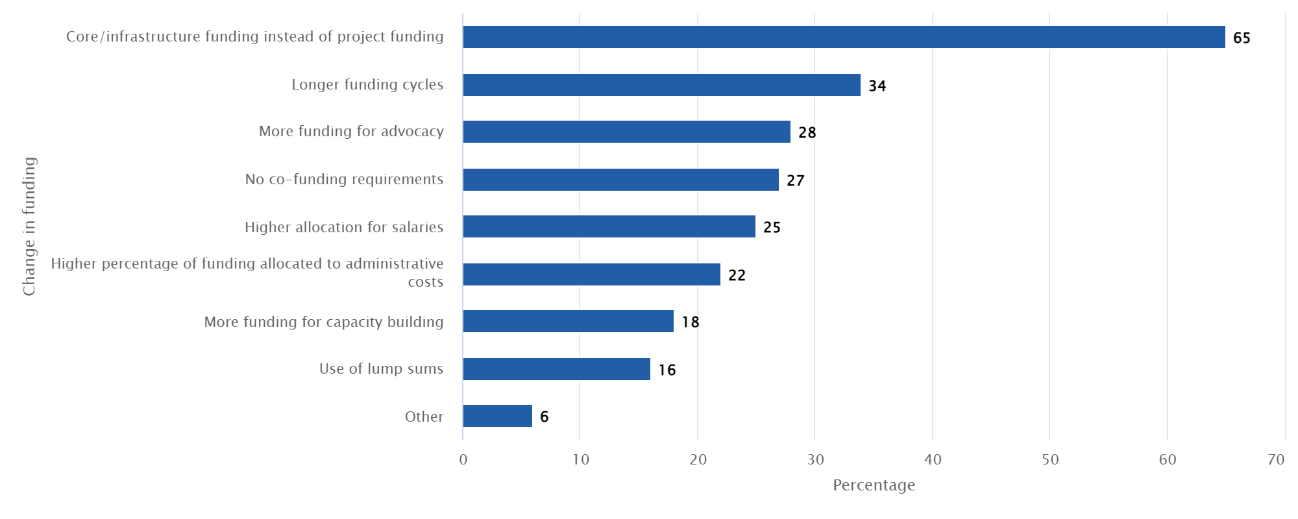
A bar chart shows the percentage of organisations would be important. The text describing the results is in the preceding paragraph.
Notes: Question: “What changes in funding would be the most important for your organisation?” N = 297.
Source: FRA’s civic space consultation 2022
The issue of how to fund CSOs goes beyond mere technical questions on the implementation of funding. Donors are seeking to find ways to apply impact-based indicator frameworks, to mainstream non-discrimination into funding and to support new forms of activism such as social movements and online activism.[173] Interviews with representatives of donors and grantees (Ariadne, Mott Foundation, Civitates, European Center for Not-for-Profit Law); European Commission (2023), Summary Report, A thriving civic space for upholding fundamental rights in the EU: looking forward - Follow up seminars to the 2022 Report on the Application of the EU Charter of Fundamental Rights (forthcoming); European Civic Forum and Civil Society Europe (2023), ‘How can we enable, protect and expand Europe's civic space, to strengthen democracy, social and environmental justice? Recommendations for the European Commission’. They are also considering how grantees can be asked to declare or advertise funding sources in a way that does not put grantees at risk. For example, 30 % of respondents in FRA’s 2022 civic space consultation who experienced threats and attacks say that these were related to specific sources of funding for their organisation.[174] Ibid.
Some private donors have developed a specific approach to funding known as ‘trust-based funding’. Key features include (1) the multi-year funding period in which the grantee deploys the funding where it best sees fit, (2) the reduction of paperwork through simplified approaches to applications and reporting, (3) donor transparency and open communication, (4) donors truly knowing their grantees and building a relationship, (5) feedback loops and continuous learning cycles and (6) responsive, adaptive, non-monetary support to bolster leadership, capacity and organisational health.[175] Trust-Based Philanthropy Project (n.d.), ‘A trust-based approach’; and National Philanthropic Trust (2022), ‘Trust-based philanthropy: A primer for donors’, 16 March 2022.
Finally, donors can support CSOs under pressure in a range of ways beyond funding, for example by:[176] European Commission (2023), Summary Report, A thriving civic space for upholding fundamental rights in the EU: looking forward - Follow up seminars to the 2022 Report on the Application of the EU Charter of Fundamental Rights (forthcoming).
- conducting political advocacy with governments, defending the added value of CSOs;
- raising public awareness of the role and importance of civil society’s work and its contribution to human rights and democracy;
- informing themselves and others about challenges and pressures on civic space;
- developing civil society, conducting outreach across regions, building the capacity of organisations and coaching grantees;
- consulting meaningfully with CSOs before, during and after the funding period to ensure that the funding is best targeted;
- including civil society representatives in their conversations with states/ministries.
